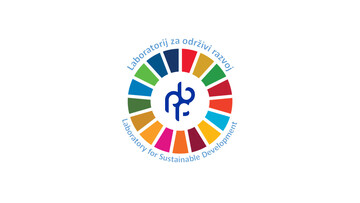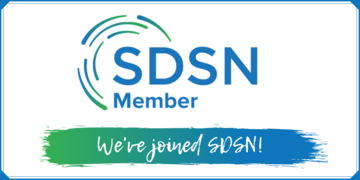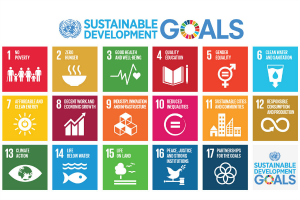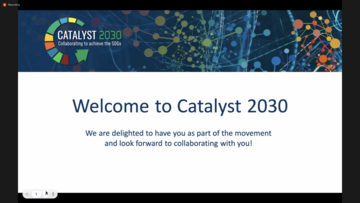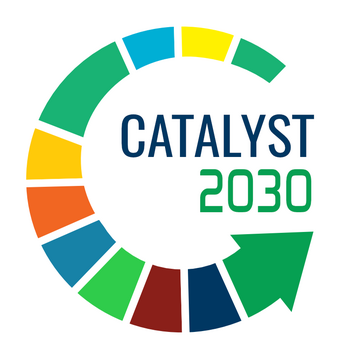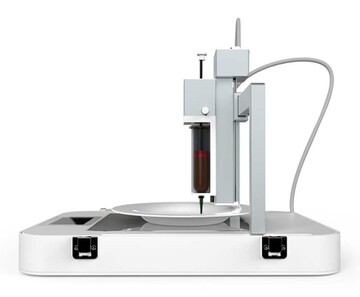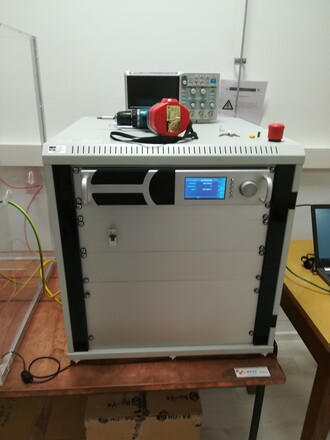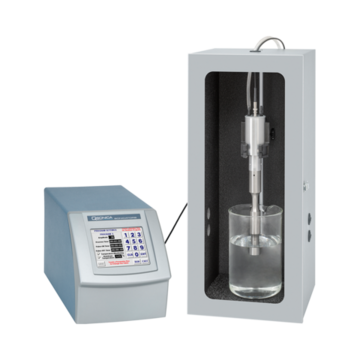Laboratory for sustainable development
Representative
Anet Režek Jambrak, PhD
| Phone: | + 385 1 4605 287 |
| Fax: | + 385 1 4836 072 |
| Email: | anet.rezek.jambrak@pbf.unizg.hr |
In brief, working area and focus of Laboratory activities are:
1. nonthermal and advanced thermal processing technologies
2. sustainability in biosciences
3. Industry 4.0 and future digitalization
4. processing in bioscience technologies
5. interdisciplinary sciences and sustainability
In details:
Laboratory for sustainable development was established 29.10.2019.
| |
|
| https://www.unsdsn.org/ https://sdgs.un.org/goals https://www.un.org/sustainabledevelopment/development-agenda/ |
|
Member of Catalyst2030 |
Laboratory is fully supported by the Strategy of the University of Zagreb, in particular :
The main strategic objective of the " Research, Technology Transfer and Innovation Strategy " is to foster scientific excellence, innovation, collaboration and a multidisciplinary approach to research in various fields and technologies, and to ensure the long-term recognition and recognition of the University of Zagreb in the European environment. Furthermore, the objective is to contribute to sustainable growth of the Croatian economy and society as a whole, which would be, by the foundation of this interdisciplinary Laboratory conducted faster and more efficiently .
The Strategic Plan for the Development of the Faculty of Food Technology and Biotechnology, 2013-2018, also states that Faculty will be recognized as a component of the University of Zagreb with a clear research profile characterized by research excellence recognized internationally, and that interdisciplinary research and collaboration of researchers in various scientific fields will be encouraged. Furthermore, according to the " Development Strategy of the Faculty of Food Technology and Biotechnology, University of Zagreb, 2019-2025 ". it is emphasized :
"The results of the research have led to the international recognition of the faculty as a center of scientific excellence in this scientific field. Faculty of Food Technology and Biotechnology is recognized as a Faculty with a clear research profile characterized by research excellence recognized internationally. By creating new ideas and technological solutions, critical thinking and creativity, PBF is a key driver of the economy and sustainable development in the field of biotechnology in the Republic of Croatia. "
The primary focus of the Laboratory is focused on the harmonization of the teaching program and the strategy based on sustainability and sustainable development in the food technology, biotechnology and nutrition, which will be realized by incorporation of the results and findings of research in teaching , especially at the graduate and doctoral level. Also, the organization of such Laboratory will enable Faculty to be positioned as a leading educational institution in the Republic of Croatia and beyond, and will highlight education, research and development in accordance with United Nations guidelines; that is, the Agenda for Sustainable Development 2030 guidelines - sustainable development goals - SDG.
The role and tasks of the Laboratory : The laboratory is participating in the training of students in terms of sustainability, processes and production technologies and components of sustainability in food technology , biotechnology and nutrition.It is planned to connect scientific research activities and projects within the future cooperation and close connection to the industries of the Republic of Croatia, countries of EU and the world, with a view to ensuring sustainability and sustainable development. Given the fact, that this is the first sustainability research laboratory in Croatia in higher education, would point out Faculty as a very important stakeholder of the future sustainable development, as well as its' role of leader in the field of sustainability of food technology, biotechnology and nutrition in Croatia and beyond .
The scope of work of the Sustainable Development Laboratory would include biotechnical sciences and relevant interdisciplinary sciences. Sustainable development is a topic of national and international scientific programs and requires coordination of many issues. Most of all and above all, requires the rapid implementation of improvements in the "eco-efficiency", energy and efficiency. Furthermore, it is the identification of a wide range of the usage of natural materials with the minimization of waste. Life cycle assessment and circular economy (LCA Guide, 1997), which builds on a long-term international interest will be implemented.
Also, main focus is on application of nonthermal and advanced technologies in processing, as "cleaner technologies" required for improvement "eco-efficiency" through the life cycle of a product or system.
Industry 4.0 and elements of digitalization are parts of Laboratory focus with the aim of improving agri-food processing, and in collaboration with small and medium size enterprises.
The Role and Importance of the Laboratory for the students, is to provide training in basic concepts of sustainability in food technology, biotechnology and nutrition, thereby modernizing their preparation for a competitive EU labor market that requires eco-efficiency trained professionals.
The strategy and vision of the Laboratory includes the implementation of teaching through the Sustainability module of advanced (nonthermal and advanced thermal) food processing techniques, and in the future through the Sustainability module in biosciences and Industry 4.0 in biosciences. Classes will be taught in Croatian and English, which will also enable enrolment of students from abroad.
Extensive international and domestic teaching experiences of Laboratory members will greatly influence in successful teaching. This will enable a better positioning of the Faculty as quality partner in the internationalization of education, as well as new competitive areas of study.
Laboratory is focused on providing support with application development and research projects at the Faculty, future European and national projects, where will be necessary to point out a necessary component of sustainability. The Laboratory would promote sustainability through the application and implementation of international projects in collaboration with renowned experts and scientists from all over the world, active student participation in the research activities of the Laboratory and publication of research results. The promotion of the Laboratory to the public would also be realized through the web pages of the Laboratory in Croatian and English language.
By teaching modules and participating in the research activities of the Laboratory, students will:
(i) gain knowledge of the energy and environmental parameters and applications of advanced thermal and nonthermal sustainable processing techniques and be able to critically evaluate the advantages and disadvantages of particular techniques;
(ii) to learn what does the term sustainable processing in food technology and biotechnology means ; learn the legislative regulations related to the use / characterization of sustainable techniques ; be able to implement the results of laboratory research in industrial practice;
(iii) the master of use of sustainable techniques as a tool in processing of by-products (waste) from agri-food network;
(iv) evaluate acceptability of obtained sustainable (bio) technologies by consumers; analysisi using software - to analyze "sustainability" parameters (LCA, Quality Function Deployment);
(v) have the possibility of direct communication with international and local experts / scientists who have expertise related to use of advanced thermal and nonthermal techniques and experts in sustainable development.
(vi) apply elements of Industry 4.0 (Internet of Things, 3D printing etc.)
Students and employees are able to apply this knowledge through projects at national and EU level, and beyond. Knowledge and skills will include applying the latest research findings and applying sustainable techniques in (industrial) practice, the ability to implement sustainable techniques in existing plants in the food process industry and biotechnology, optimizing and designing the processing plan and process parameter. In addition, they will gain the knowledge to choose the best technique for their own research (or for industrial purposes), and to implement the acquired knowledge with respect to the energy consumption of individual processes.
It should be noted that students and researchers will independently apply the tools and methods used in sustainability assessments, which is essential today for knowledge of processes and technologies in food technology and biotechnology to ensure strategic business development, product development and production systems improvement, and good marketing placement. Economic point of view, with social and environmental impact of novel processes, will be included in education and research.
Standard methodology of analysis, tools and concepts like: " Quality function deployment , Green Technology , Clean label , Clean processing and production , carbon , waste and water footprint and zero waste " etc. will be discussed. It must be stated that it is necessary to estimate the life cycle assessment ( LCA - Life Cycle Assessment ), vital and powerful tool that includes an estimation of the total environmental impact, while complementing other equally needed methods and processes to effectively and efficiently sustain consumption and production.
Until now, LCA has been most commonly used to assess the environmental impact of certain products and industrial processes. Nevertheless, there is a growing need in research highlighting LCA application in the agricultural, food and biotechnology sectors, in line with the 2030 Global Sustainable Development Goals (The 2030 Agenda for Sustainable Development , https://sustainabledevelopment.un.org), adopted by the UN - 2015 .
The role and importance of the Laboratory for industry in Croatia , above all, would be reflected in the improvement of industry competitiveness. Sustainable processing techniques are believed to be commonly applied in the developed countries and their industries. This is because consumers in the markets of developed countries, which are of strategic interest and industry in the Republic of Croatia, demand high quality and safety of food with minimal environmental impact.
In addition to enhancing the environmental and generally responsible social awareness of consumers, in the future, more attention is dedicated to the selection of food products while meeting the ecological and ethical criteria of production. It is therefore essential to assess all the adverse impacts of the production process, the utilization of raw materials and the distribution system on the environment for the purpose of sustainable development, the competitiveness of economies and more.
The laboratory will work and carry on with established cooperation with recognized experts from home and abroad, whether from institutions of higher education and science, either from the economy and the real sector, which is in agreement with the development strategy of Croatia ("Strategies and Development - Croatia in the 21st century ( 2002) " ), which defines four main strategic goals for further development ( Strategy for Sustainable Development of the Republic of Croatia ) :
1. Achieving economic development and well-being of citizens with balanced regional development,
2. Involvement in European Economic Integration,
3. Raising the quality of human capital by investing in education and science, increasing the quality of life, reducing negative demographic trends,
4. Maintaining national security through technological modernization and investment in defense and security (NATO).
Goals will be achieved by starting from the analysis of the situation and the vision of a sustainable and functional waste management system, at the same time taking into account the strategic goals of the Republic of Croatia and the objectives of the National Environmental Strategy. Also, defining the strategic goals whose achievement is guaranteed by strengthening the system and its operation to obtain the basic functions, i.e. protection of human health and the environment and rational use of resources. In order to gradually reduce waste and impact to the environment and human health and to achieve sustainability, specific conditions must be created that will:
(1) reduce waste generation, leading to better use and protection of resources,
(2) reduce quantities that are disposed of (or irresponsibly discarded) and
(3) reduce waste risks.
All this is in line with strategy of the Laboratory which includes training on strategic goals matter of waste management and:
1. Avoidance of generation and reduction of waste during processing and processing in food technology and biotechnology ;
2. Reducing the risk of waste during processing and processing in food technology and biotechnology ;
3. Education of future experts to solve the problem of management and waste management and sustainable processes.
Stakeholders interested in the Laboratory's work will enable students and staff to develop internships or training through ERAMSUS+ and other programs in world-class laboratories and universities, in collaboration with renowned scientists. In the period from 2016 to the present day, prof. dr. sc. Anet Režek Jambrak provides classes in English, for students enrolling in ERASMUS + courses. Foreign students enrolled in the course Innovative Non-thermal and Thermal Food Processing Techniques, as an existing course for study in the Croatian language (Food Process Engineering 2). The content of the course will be, in future, titled Sustainability of advanced thermal and nonthermal food processing techniques, and taught in English.
In conclusion, President of Croatia, the Croatian Parliament, University of Zagreb, domestic and foreign scientific community, industry, consumers, and all other interested stakeholders support established Laboratory and necessity of the establishment of this kind of laboratory in the Republic of Croatia.
The Laboratory will fully participate in the expansion of education and scientific research related with the possible application of sustainable techniques (processing) in agri-food digitalized chain and biotechnology. The Laboratory and partner stakeholders will encourage the transfer of knowledge about sustainable processing techniques that are widely used in the developed and industrialized world to promote socially responsible processing and production.
Supporters of the establishment of the Laboratory, and the intention of cooperation with the newly established Laboratory
| Institution | Contact person | Country |
| Office of the President of the Republic of Croatia | Kolinda Grabar-Kitarovic | CRO |
| Croatian Parliament, Committee on Environmental Protection | Prof. PhD. Slaven Dobrović | CRO |
| Faculty of Food Technology and Biotechnology, Zagreb | Prof. PhD. Damir Ježek | CRO |
| Faculty of Food Technology and Biotechnology, Zagreb | Prof. PhD. Višnja Bačun Družina | CRO |
| Faculty of Food Technology and Biotechnology, Zagreb | Prof. PhD. Anita Slavica | CRO |
| Faculty of Food Technology and Biotechnology, Zagreb | Prof. PhD. Vesna Zechner -Krpan | CRO |
| Faculty of Food Technology and Biotechnology, Zagreb | Prof. PhD. Ksenija Durgo | CRO |
| RED Fork , SME | Diana Gluhak Spajić, M.Sc. nutr. | CRO |
| Faculty of Tourism and Hospitality Management Opatija, Department of Food and Nutrition | Prof. PhD. Greta Krešić | CRO |
| Faculty of Electrical Engineering and Computing, Department of Electroacoustics; Department of Electronic Systems and Information Processing; Zagreb |
Assoc. prof. PhD Antonio Petošić; Prof. PhD. Ratko Magjarević |
CRO |
| Faculty of Chemical Engineering and Technology; Zagreb | Assoc. prof. PhD. Domagoj Vrsaljko | CRO |
| Faculty of Agriculture; Zagreb | Assoc. prof. PhD Marko Vinceković; Assis. prof. PhD Luna Maslov Bandić; Slaven Jurić, mag. nutr . |
CRO |
| Rudjer Bosković Institute; Zagreb | PhD. Danijela Barić; PhD. Sc. Nadica Maltar Strmečki |
CRO |
| Institute of Agriculture and Tourism; Poreč | PhD. Dan Ban | CRO |
| Faculty of Pharmacy and Biochemistry; Zagreb | Assoc. prof. PhD Dubravka Vitali Čepo | CRO |
| Faculty of Mechanical Engineering and Naval Architecture, Zagreb | Prof. PhD. Slaven Dobrović; Assoc. prof. PhD Hrvoje Juretić |
CRO |
| Industry | Contact person | Country |
| Elea Vertriebs - und Vermarktungsgesellschaft gmbH ; Quakenbrück | Prof. Stefan Töpfl | GER |
| Franck d.o.o, Zagreb | Marijana Hudina Domladovec, MS ing | CRO |
| SIC doo, Višnjan | Mag. oecol. Ariana Stojnić | CRO |
| Dukat d.d, Zagreb | Željka Golem, MS ing | CRO |
| Cedevita d.o.o, Atlantic group, Zagreb | Mr. Sc. Nevenka Vrac, MS ing | CRO |
| Lesaffre Adriatic d.o.o. | Jerko Penic, MS. ing | CRO |
| International scientific community | Contact person | Country |
| University of Avignon, GREEN Extraction Team (alternative extraction techniques and solvents ); Avignon | Prof. Farid Chemat | FRA |
| University of Natural Resources and Life Sciences, Institute of Food Technology; Vienna | Prof. Dr. Henry Jäger | AUT |
| University of British Columbia; Faculty of Land and Food Systems (LFS); Vancouver, Canada | Dr. Anubhav Pratap Singh | CAN |
| Institute of Agronomy, University of Lisbon ; Lisbon | Prof. Isabel Maria Nunes de Sousa | POR |
| Faculty of Biotechnology of the Catholic University of Portugal, CBQF - Centro de BIOTECNOLOGIE e Química Fina - Center of Biotechnology and Fine Chemistry, Laboratório Associado , Escola Superior de BIOTECNOLOGIE ; Portugal | Prof. Cristina LM Silva | POR |
| Lund University, Department of Food Technology, Engineering and Nutrition; Lund | Dr. Federico Gómez Galindo | SWE |
| Department of Chemical and Materials Engineering, Faculty of Engineering, The University of Auckland; Auckland | Prof. Mohammed Farid | NZL |
| Warsaw University of Life Science (SGGW), Department of Food Engineering and Process Management; Warsaw | Prof. Dorothy Witrow-Rajchert | POL |
| The Global Harmonization Initiative (GHI) | Prof. Dr. hc . Huub Lelieveld | NL |
| Dublin Institute of Technology, College of Science and Health; Dublin | Prof. Paula Bourke
|
IRL |
| Department of Industrial Engineering at the University of Salerno ; Fisciano |
prof. Giovanna Ferrari; prof. Francesco Donsi ; prof. Gianpiero Pataro |
ITA |
| Armenian Society of Food Science and Technology; FoodLab Scientific , Armenian Society of Food Science and Technology at Yerevan State University; Yerevan | Dr. Assoc . prof. Karina Grigoryan | ARM |
| Luxembourg Institute of Science and Technology; Luxembourg | Dr. David Duday | LUX |
| University of Nairobi, College of Agriculture and Veterinary Sciences, Department of Food Technology and Nutrition; Nairobi | Dr. George Ooko Abong | KEN |
| Technical University of Valencia, School of Agricultural Engineering, Valencia |
Prof. Dr. Jose V. Garcia-Perez | ESP |
| Ege University, Food Engineering Department, Faculty of Engineering ; Izmir | Prof. Dr. Taner Baysal | TUR |
| Consulting and Training Center KEY | Prof. Dr. Vladimir Kakurinov | NM |
| University of Malta, Faculty of Health Sciences, Department of Food Sciences and Nutrition; Msida | Dr. Vasilis Valdramidis | MLT |
| University of Ljubljana, Faculty of Electrical Engineering, Laboratory of Biocybernetics ; Ljubljana | Prof. Damian Miklavcic | SLO |
| University of Belgrade , Faculty of Agriculture ; Zemun | Dr. Ilija Djekic | SRB |
| Health Sciences and Technology D-HEST; Sustainable food processing Laboratory, Institute of Food, Nutrition and Health IFNH, ETH Zurich |
Prof. Dr.-Ing. Alexander Mathys | SWISS |
| Institute of Agrochemistry and Food Technology (IATA-CSIC), Dept . Biotechnology, Spanish National Research Council (CSIC) | Dr. Maria Carmen Collado | ESP |
| University of Aveiro, Departamento de Química ; Aveiro | Jorge Manuel Alexandre Saraiva | POR |
| Food Process Engineering at the University of Applied sciences; Osnabrück | Prof. Stefan Töpfl | GER |
| Irish Agriculture and Food Development, Food Chemistry and Technology, Teagasc Food Research Center; Dublin | Prof. Brijesh K. Tiwari | IRL |
| Universidad Católica de Murcia ; Murcia | Prof. Dr. Vicente Manuel Gómez López | ESP |
| Semen Institute for Chemical Physics of the Russian Academy of Sciences (ICP RAS), Moscow |
Prof. Alexey L. Pomerantsev ; Prof. Oxana Ye Rodionova |
RUSSIA |
| National Technical University of Athens , School of Chemical Engineering, Laboratory of Food Chemistry and Technology; Athens |
Prof. Dr. Petros S. Taoukis | GRE |
| Ponta Grossa State University - Avenida Carlos Cavalcanti , Department of Food Engineering; Ponta Grossa | prof. Dr. Daniel Granato | BRA |
| Department of Biological Engineering, University of Minho, Minho | Prof. José António Couto Teixeira | POR |
| Vilnius university; Llithuania | Prof. Luksiene | LTU |
| Sofia University St. Kliment Ohridski; Sofia | Prof. Dr. Evgenia Benova | BUL |
| Department of Food Science and Nutrition, College of Food, Agricultural, and Natural Resources Sciences; Minnesota | Prof. Dr. Kumar Mallikarjunan | USA |
| Technion - Israel Institute of Technology | Faculty of Biotechnology & Food Engineering, Laboratory for Novel Food & Bioprocessing ; Haifa | Asst.Prof.Avi Shpigelman | ISR |
| University of Otago, Department of Food Science; Dunedin | Alaa El-Din Bekhit; Prof. Indrawati Oey |
NZL |
| Brno University of Technology, Faculty of Chemistry , Plasma chemistry laboratory ; Brno | Prof. Dr. Franišek Krčma | CZE |
| Ankara University, Faculty of Engineering, Department of Food Engineering; Ankara | Prof. Kezban Candogan | TUR |
| Alexander Technological Educational Institute of Thessaloniki , Department of Food Technology, Section of Mechanical Processing and Food Technologies; Thessaloniki | Prof. Maria Papageorgiou | GRE |
| Max Rubner Institute, Institut für Lebensmittel und Bioverfahrenstechnik ; Karlsruhe | Dr. Ralf Greiner | GER |
| University of Copenhagen , Department of Food Science; Copenhagen | Prof. Lilia Ahrné Former President of EFFOST |
DEN |
Employees
| Name and surname | Academic title | Job title |
|---|---|---|
| Anet Režek Jambrak | PhD | Full Professor |
| Josipa Dukić | mag. ing. | Scientific Assistant |
| Marinela Nutrizio | mag. | Scientific Assistant |
Courses (preddiplomski)
| Course Title | Course number | ECTS |
|---|---|---|
| Physical Properties of Food | 252799 | 5 |
| Physical properties of food systems | 32406 | 5 |
Courses (diplomski)
| Course Title | Course number | ECTS |
|---|---|---|
| Industry 4.0 in Biotechnical Sciences | 253087 | 3 |
| Sustainability of Advanced Food Processing Technologies | 253085 | 3 |
Courses (doktorski)
| Course Title | Course number | ECTS |
|---|---|---|
| Sustainable techniques for processing of food and agro-food by-products | 3 |



